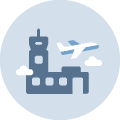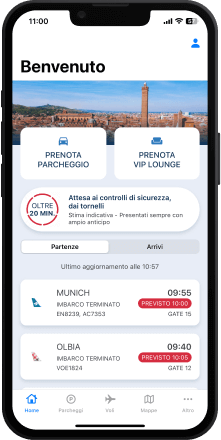Strategy and execution
 Maximise financial performance
Maximise financial performance
The outbreak and spread of the pandemic severely impacted the aviation sector in 2020, deeply weakening its ability to contribute to wealth and well-being. The Bologna Airport system is no exception. Due to the pandemic and the consequent slowdown in airport activity, jobs and the GDP generated by the local area dropped sharply in 2020 and 2021 compared to 2019.
For AdB, 2021 closes with a consolidated loss of Euro 6.7 million compared to a loss of Euro 13.6 million in 2020. While the 50.6% improvement is significant, it is still a far cry from the results of the last pre-COVID year, which closed with a net profit of Euro 20.9 million. EBITDA in 2021 is positive Euro 3.5 million compared to a margin of Euro -3.9 million in 2020 and Euro +44.9 million in 2019, positive thanks to revenue growth which is closely linked to the recovery in traffic volumes against a backdrop of greater cost rigidity, considering the typical high fixed-cost structure of airport operators. From a financial viewpoint, the AdB Group faced the 2021 with a solid and balanced equity and financial structure, which has allowed it to meet its commitments even in those months of greatest pressure on liquidity.
 Performing and sustainable corporation
Performing and sustainable corporation
Among the main initiatives carried out by AdB in 2021 with regard to sustainability and innovation, there are the Sustainability Plan 2021-2030 and the Innovation Plan.
The Innovation Plan includes c. 50 initiatives assigned to different cross-functional working groups and are mainly related to: Big Data & BI, Communication, Customer Service, Cyber Security, Technological infrastructure, Internal Systems, Development of airport/territory relationship with local community and Operating technologies.
AdB's Sustainability Plan is structured around three pillars: PLANET, PEOPLE, and PROSPERITY, which relate to environmental, social and economic sustainability topics respectively. The Group has defined action areas and strategic objectives for each pillar.
 Connect
Connect
Between 2009 and 2019 passenger traffic grew at a consistently higher rate at Bologna Airport than in Italy as a whole. AdB worked with carriers to accelerate recovery, which is evidenced by the official figures for 2021, year in which about 4.1 million passengers have travelled through Bologna Airport, improving by +64% vs 2020 but falling -56% vs 2019. The recovery is driven by the advanced countries (especially by the United States), despite the heterogeneity of the GDP trend in the rest of the world, where few countries still register a slowed recovery due to the Omicron variant and increase in raw material prices.
AdB continues to register a slowdown of the international traffic with respect to 2019 levels (-65%), while the domestic trend signals a better recovery (-22%), pushed by the positive impact of the gradual loosening of travel-related Covid restrictions. The 2021 recovery with respect to 2020 results has mainly interested the low-cost traffic (+87% vs 2020 and -45% vs 2019), showing a better resilience compared to legacy carriers. With regard to the cargo traffic, again performed better than passenger traffic, with the volume of cargo transported by air reaching 2019 levels (+2,1%). The average load factor increased from 60,5% in 2020 to 68,7% in 2021.
In 2021, AdB continued its efforts – in cooperation with local authorities and transport operators – to maintain and improve its levels of airport accessibility despite the pandemic, with the People Mover – a high-speed monorail (5km) that connects the airport to Bologna railway station, with a journey time of about 7.5 minutes.
 Develop
Develop
AdB’s infrastructure currently supports traffic of approximately 9.5 million passengers a year and is managed according to various planning instruments such as the Air Terminal Use Plan, the Extraordinary Maintenance Plan in the near term and the Master Plan in the medium and long term.
The investments outlined in the Master Plan and Regulatory Agreement are fundamental to the development of the Company's business, with also short/medium-term initiatives that are aimed at increasing capacity and improving service levels by means of internal retrofits and limited expansion. In particular, in 2021 a new cargo building was constructed and brought into operation for a leading operator, while work also began on the construction of a new aircraft apron and the expansion and upgrading of security and outgoing passport controls.
Total non-aviation business revenues in the period declined 12.6% on 2020 and 54.3% on 2019. The decline in 2021 on 2020 is primarily due to the changes in traffic on 2019 levels related to the Covid pandemic, review of the contractual basis agreed by the operator with the retail sub-concessionaires to support them in the emergency phase and the reduced level of revenues coming from investment, only partially offset by an increase in real estate revenues due to a new sub-concession agreement related to new areas delivered during the year.
 Experience
Experience
As part of its development strategies, the Group works every day with unwavering commitment to provide passengers with a unique travelling experience that prioritises customers through efficient innovative services, and a comfortable, functional infrastructure.
From its earliest stages, the COVID-19 emergency prompted Group to review its passenger assistance processes and to establish new priorities in terms of safety, social distancing, hygiene, and digitalisation, confirming and strengthening in 2021 all the anti-contagion measures. Therefore, in 2021 AdB renewed its ACI Health Accreditation: the recognition from the European airport association on health and safety for passengers and airport users.
The Group also continues to take surveys on the quality of standard services and on ASQ program indicators. The surveys faithfully reflected satisfaction trends in line with traffic growth, as per the contextual framework outlined above. The strengths of our airport were confirmed by the courtesy and professionalism of the airport staff, the ease of moving around the airport and the sense of security.
 Care
Care
Communication played an important role in Bologna airport’s efforts to manage the health emergency and mainly concerned passengers and airport workers. The airport's website and social media channels were key to providing passengers with timely, up-to-date information, in addition to providing answers to various questions.
A new section of the website, directly accessible from the homepage has been activated for passengers, named, "COVID-19: Travel informed”, including 2 sections: "Latest updates”, with constantly updated news on the new rules for passengers, and "Insights" which describes what AdB has done since the beginning of the pandemic to ensure health and safety at the airport. Regarding pandemic issues, we note the constant and fruitful collaboration between AdB and the Bologna Local Health Unit (AUSL), which enabled the Company to comply with the various rules issued by the government during the year with reference to "at risk" countries and “COVID-free" flights. Several initiatives were added to the AdB Welfare Plan during the pandemic, including the stipulation of a health care policy to cover COVID-related hospitalisations, the introduction of the Smart Working Emergency, flexible clock-on and clock-off times, the extension of the single-parenting agreement and the Hour Bank agreement to help single parents with children and the granting of extended periods of voluntary redundancy in the case of particular needs.
In 2021 Bologna Airport obtained Level 3 - Optimisation accreditation as part of the international "Airport Carbon Accreditation" programme; the certification promoted by ACI-Europe aimed at airport management companies that intend to pursue "carbon neutrality" objectives.



